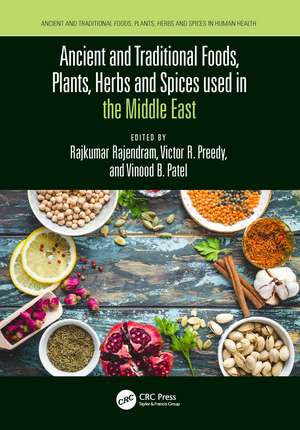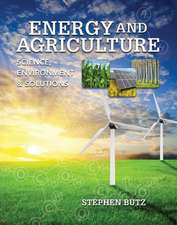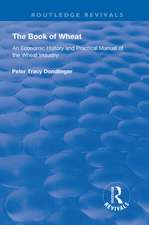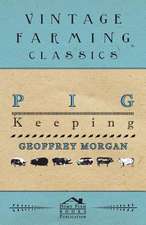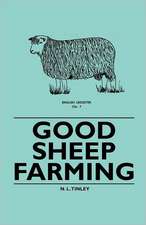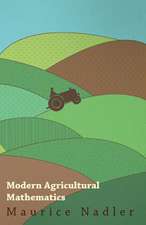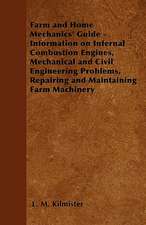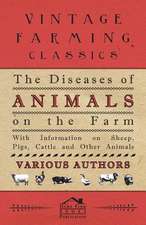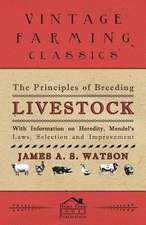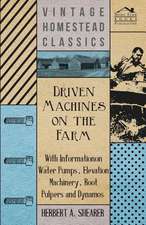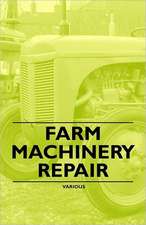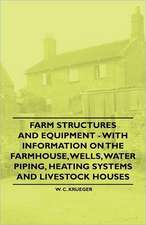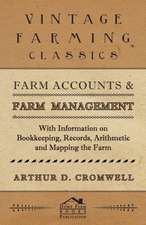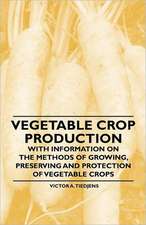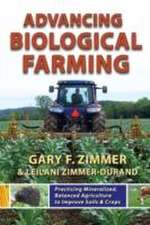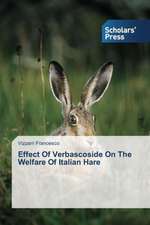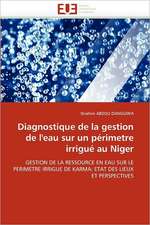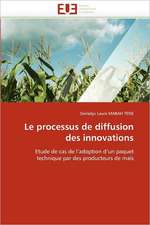Ancient and Traditional Foods, Plants, Herbs and Spices used in the Middle East: Ancient and Traditional Foods, Herbs, and Spices in Human Health
Editat de Rajkumar Rajendram, Victor Preedy, Vinood Patelen Limba Engleză Hardback – 25 aug 2023
Features
· Describes uses and applications of plant-based materials from different countries of the Middle East.
· Each chapter has unique cross references to foods, herbs, spices and botanicals
· Bridges molecular biology, physiology and medical sciences
· Coverage includes herbal medicines, supplements, lifestyle patterns, nutrition, and plant-based diets
· Each chapter describes usage and applications of traditional foods and botanicals; historical background; toxicity; cautionary notes; and summary points
There have been considerable advances in scientific techniques over the last few decades. These have been used to examine the composition and applications of traditional cures. Modern science has also seen the investigation of herbs, spices and botanicals beyond their traditional usage. Written by international experts, this is an essential read for food researchers, food scientists, and nutritionists, researchers and health professionals with an interest in the potential therapeutic value of Middle Eastern food components. The book will also be of relevance to physicians and pharmacologists.
Preț: 882.16 lei
Preț vechi: 1257.38 lei
-30% Nou
Puncte Express: 1323
Preț estimativ în valută:
168.79€ • 177.18$ • 140.11£
168.79€ • 177.18$ • 140.11£
Carte tipărită la comandă
Livrare economică 10-24 aprilie
Preluare comenzi: 021 569.72.76
Specificații
ISBN-13: 9781032152868
ISBN-10: 1032152869
Pagini: 391
Ilustrații: 42 Tables, black and white; 2 Line drawings, color; 25 Line drawings, black and white; 36 Halftones, black and white; 2 Illustrations, color; 61 Illustrations, black and white
Dimensiuni: 178 x 254 mm
Greutate: 0.82 kg
Ediția:1
Editura: CRC Press
Colecția CRC Press
Seria Ancient and Traditional Foods, Herbs, and Spices in Human Health
ISBN-10: 1032152869
Pagini: 391
Ilustrații: 42 Tables, black and white; 2 Line drawings, color; 25 Line drawings, black and white; 36 Halftones, black and white; 2 Illustrations, color; 61 Illustrations, black and white
Dimensiuni: 178 x 254 mm
Greutate: 0.82 kg
Ediția:1
Editura: CRC Press
Colecția CRC Press
Seria Ancient and Traditional Foods, Herbs, and Spices in Human Health
Public țintă
General, Postgraduate, and Undergraduate CoreCuprins
1. Grains and Pulses in Diets of the Middle East with a Focus on Buckwheat 2. Dietary Patterns in the Middle East and Fatty Liver Disease 3. Fatty Acids in Different Foods of Middle Eastern Diets: Implications for Health 4. The Link of Lifestyle Patterns and Nutrition in Iran with Health and Traditional Diets 5. Traditional Medicinal Foods in Persian Medicine: An Overview of Current Evidence 6. Traditional Dietary Patterns in the Elderly: Iranian Aspects 7. Syrian Herbs in Health and Disease 8. Aloe Vera (Aloe Barbadensis) Usage in the Middle East: Applications for Gastroesophageal Reflux 9. Arta (Calligonum Comosum) in the Middle East and Biomedical Applications 10. Conehead Thyme/Thymus Capitatus (Thymus Capitatus) and Evidence-Based Usage in Eradicating Helicobacter Pylori 11. Cumin (Cuminum Cyminum) Usage in the Middle East and Biological Basis of its Actions 12. Frankincense (Boswellia Sacra Flueck.) and its Usage in the Middle East: Molecular, Cellular and Biomedical Aspects 13. Khella (Ammi Visnaga), Molecular and Cellular Aspects and Potential in Biomedicine 14. French Marigold (Tagetes Patula L.): Phytochemical and Bioactive Targets of Secondary Metabolites 15. Oak Gall (Quercus Infectoria G. Olivier Gall): Pharmaceutical Usage and Cellular Targets 16. Pelargonium Species and their Usage in the Middle East as Medicinal Herbs 17. Saffron (Crocus Sativus) as a Middle East Herb: Traditional and Modern Medicinal Applications 18. Sage Plants (Salvia sp.; Lamiaceae) in the Middle East: Phytochemistry, Ethnopharmacology and Traditional Use 19. Paronychia Argentea L. Usage in the Middle East (Jordan) and its Biomedical Profiles 20. Taily Weed (Ochradenus Baccatus Delile) as a Middle Eastern Herbal: Biological Activities and Profiles 21. Tomato (Lycopersicon Esculentum Miller) from Egypt and Phytochemical Usage; Phenolics and Flavonoids 22. Turmeric (Curcuma Longa L.) Usage in the Middle East: A Comprehensive Review 23. Veined Dock (Rumex Pictus Forssk.) Usage in the Middle East, Phytochemical Constituents, and Biological Effects of the Extracts 24. Recommended Resources for the Scientific Study of Foods, Plants, Herbs, and Spices Used in the Middle East
Notă biografică
Victor R. Preedy BSc, PhD, DSc, FRSB, FRSPH, FRCPath, FRSC is a staff member of the Faculty of Life Sciences and Medicine within King's College London. Professor Preedy is also a member of the Department of Nutrition and Dietetics (teaching), Director of the Genomics Centre of King's College London and Professor of Clinical Biochemistry (Hon) at Kings College Hospital. Professor Preedy graduated in 1974 with an Honours Degree in Biology and Physiology with Pharmacology. He gained his University of London PhD in 1981. In 1992, he received his Membership of the Royal College of Pathologists and in 1993 he gained his second doctorate (DSc), for his outstanding contribution to protein metabolism in health and disease. Professor Preedy was elected as a Fellow to the Institute of Biology in 1995 and to the Royal College of Pathologists in 2000. Since then he has been elected as a Fellow to the Royal Society for the Promotion of Health (2004) and The Royal Institute of Public Health (2004). In 2009, Professor Preedy became a Fellow of the Royal Society for Public Health and in 2012 a Fellow of the Royal Society of Chemistry. Professor Preedy has carried out research when attached to Imperial College London, The School of Pharmacy (now part of University College London) and the MRC Centre at Northwick Park Hospital. He has collaborated with research groups in Finland, Japan, Australia, USA and Germany. Prof Preedy is a leading expert on the science of health and has a long-standing interest in dietary and plant based components. He has lectured nationally and internationally. To his credit, Professor Preedy has published over 700 articles, which includes peer-reviewed manuscripts based on original research, abstracts and symposium presentations, reviews and numerous books and volumes.
Vinood B. Patel, BSc, PhD, FRSC, is currently Reader in Clinical Biochemistry at the University of Westminster and honorary fellow at King’s College London. He presently directs studies on metabolic pathways involved in liver disease, particularly related to mitochondrial energy regulation and cell death. Research is being undertaken to study the role of nutrients, antioxidants, phytochemicals, iron, alcohol and fatty acids in the pathophysiology of liver disease. Other areas of interest are identifying new biomarkers that can be used for the diagnosis and prognosis of liver disease and understanding mitochondrial oxidative stress in Alzheimer’s disease and gastrointestinal dysfunction in autism. Dr Patel graduated from the University of Portsmouth with a degree in Pharmacology and completed his PhD in protein metabolism from King’s College London in 1997. His postdoctoral work was carried out at Wake Forest University Baptist Medical School studying structural-functional alterations to mitochondrial ribosomes, where he developed novel techniques to characterize their biophysical properties. Dr Patel is a nationally and internationally recognized researcher and has several edited biomedical books related to the use or investigation of active agents or components. These books include The Handbook of Nutrition, Diet, and Epigenetics, Branched Chain Amino Acids in Clinical Nutrition, Cancer: Oxidative Stress and Dietary Antioxidants and Diet Quality: An Evidence-Based Approach, Toxicology: Oxidative Stress and Dietary Antioxidants, Molecular Nutrition: Vitamins. In 2014 Dr Patel was elected as a Fellow to The Royal Society of Chemistry.
Dr. Rajkumar Rajendram AKC BSc (Hons) MBBS (Dist) MRCP (UK) FRCA EDIC FFICM is a clinician scientist with a focus on internal medicine, anaesthesia, intensive care and peri-operative medicine. Dr Rajendram’s interest in traditional medicines began at medical school when he attended the Society of Apothecaries’ history of medicine course. He subsequently graduated with distinctions from Guy’s, King’s and St. Thomas Medical School, King’s College London in 2001. As an undergraduate he was awarded several prizes, merits and distinctions in pre-clinical and clinical subjects. Dr. Rajendram completed his specialist training in acute and general medicine in Oxford in 2010 and then practiced as a Consultant in Acute General Medicine at the John Radcliffe Hospital, Oxford. Dr Rajendram also trained in anaesthesia and intensive care in London and was awarded fellowships of the Royal College of Anaesthetists (FRCA) and the Faculty of Intensive Care Medicine (FFICM) in 2009 and 2013 respectively. He then moved to the Royal Free London Hospital as a Consultant in Intensive Care, Anaesthesia and Peri-operative Medicine. He has been a fellow of the Royal College of Physicians of Edinburgh (FRCP Edin) and the Royal College of Physicians of London (FRCP Lond) since 2017 and 2019 respectively. He is currently a Consultant in Internal Medicine at King Abdulaziz Medical City, National Guard Health Affairs, Riyadh, Saudi Arabia. Dr. Rajendram recognises that integration of traditional medicines into modern paradigms for healthcare can significantly benefit patients. As a clinician scientist he has therefore devoted significant time and effort to nutritional science research and education. He is an affiliated member of the Nutritional Sciences Research Division of King’s College London and has published over 300 textbook chapters, review articles, peer-reviewed papers and abstracts.
Vinood B. Patel, BSc, PhD, FRSC, is currently Reader in Clinical Biochemistry at the University of Westminster and honorary fellow at King’s College London. He presently directs studies on metabolic pathways involved in liver disease, particularly related to mitochondrial energy regulation and cell death. Research is being undertaken to study the role of nutrients, antioxidants, phytochemicals, iron, alcohol and fatty acids in the pathophysiology of liver disease. Other areas of interest are identifying new biomarkers that can be used for the diagnosis and prognosis of liver disease and understanding mitochondrial oxidative stress in Alzheimer’s disease and gastrointestinal dysfunction in autism. Dr Patel graduated from the University of Portsmouth with a degree in Pharmacology and completed his PhD in protein metabolism from King’s College London in 1997. His postdoctoral work was carried out at Wake Forest University Baptist Medical School studying structural-functional alterations to mitochondrial ribosomes, where he developed novel techniques to characterize their biophysical properties. Dr Patel is a nationally and internationally recognized researcher and has several edited biomedical books related to the use or investigation of active agents or components. These books include The Handbook of Nutrition, Diet, and Epigenetics, Branched Chain Amino Acids in Clinical Nutrition, Cancer: Oxidative Stress and Dietary Antioxidants and Diet Quality: An Evidence-Based Approach, Toxicology: Oxidative Stress and Dietary Antioxidants, Molecular Nutrition: Vitamins. In 2014 Dr Patel was elected as a Fellow to The Royal Society of Chemistry.
Dr. Rajkumar Rajendram AKC BSc (Hons) MBBS (Dist) MRCP (UK) FRCA EDIC FFICM is a clinician scientist with a focus on internal medicine, anaesthesia, intensive care and peri-operative medicine. Dr Rajendram’s interest in traditional medicines began at medical school when he attended the Society of Apothecaries’ history of medicine course. He subsequently graduated with distinctions from Guy’s, King’s and St. Thomas Medical School, King’s College London in 2001. As an undergraduate he was awarded several prizes, merits and distinctions in pre-clinical and clinical subjects. Dr. Rajendram completed his specialist training in acute and general medicine in Oxford in 2010 and then practiced as a Consultant in Acute General Medicine at the John Radcliffe Hospital, Oxford. Dr Rajendram also trained in anaesthesia and intensive care in London and was awarded fellowships of the Royal College of Anaesthetists (FRCA) and the Faculty of Intensive Care Medicine (FFICM) in 2009 and 2013 respectively. He then moved to the Royal Free London Hospital as a Consultant in Intensive Care, Anaesthesia and Peri-operative Medicine. He has been a fellow of the Royal College of Physicians of Edinburgh (FRCP Edin) and the Royal College of Physicians of London (FRCP Lond) since 2017 and 2019 respectively. He is currently a Consultant in Internal Medicine at King Abdulaziz Medical City, National Guard Health Affairs, Riyadh, Saudi Arabia. Dr. Rajendram recognises that integration of traditional medicines into modern paradigms for healthcare can significantly benefit patients. As a clinician scientist he has therefore devoted significant time and effort to nutritional science research and education. He is an affiliated member of the Nutritional Sciences Research Division of King’s College London and has published over 300 textbook chapters, review articles, peer-reviewed papers and abstracts.
Descriere
A volume in the Ancient and Traditional Foods, Plants, Herbs and Spices series, this book describes uses and applications of plant-based materials from different countries of the Middle East.
